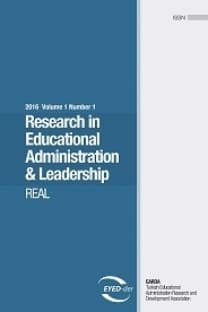The Role of School Administrators in Organizational Learning Processes
The Role of School Administrators in Organizational Learning Processes
___
- Andrews, K. M. & Delahaye, B. L. (2000) Influences on Knowledge Processes in Organizational Learning: The Psychosocial Filter, Journal of Management Studies 37(6), 797-810.
- Argote, L. (2013) Organizational Learning: Creating, Retaining and Transferring Knowledge, New York: Springer.
- Argyris, C. (1995) Action Science and Organizational Learning. Journal of Managerial Psychology, 10(6), 20-26.
- Argyris, C. (1999) On Organizational Learning, Oxford, UK: Blackwell.
- Bennett, J. V., Ylimaki, R. M., Dugan, T. M. & Brunderman, L. A. (2014) Developing the Potential for Sustainable Improvement in Underperforming Schools: Capacity Building in The Socio-Cultural Dimension, Journal of Educational Change, 15(4), 377-409.
- Brinkmann, S. (2014) Unstructured and Semistructured Interviewing. In P. Leavy (ed.) The Oxford Handbook of Qualitative Research, Oxford, UK: Oxford University Press.
- Collinson, V. & Cook, T. F. (2007) Organizational Learning: Improving Learning, Teaching, And Leading in School Systems, Thousand Oaks, CA: Sage.
- Collinson, V. & Cook, T. F. (2013) Organizational Learning: Leading Innovations, International Journal of Educational Leadership and Management, 1(1), 69-98.
- Collinson, V., Cook, T. F. & Conley, S. (2006) Organizational Learning in Schools and School Systems: Improving Learning, Teaching, and Leading, Theory into Practice 45(2), 107-116.
- Cook, S. D. & Yanow, D. (1993) Culture and Organizational Learning, Journal of Management Inquiry, 2(4), 373-390.
- Crossan, M. M., Lane, H. W. & White, R. E. (1999) An Organizational Learning Framework: From Intuition to Institution, The Academy of Management Review, 24(3), 522-537.
- Donaldson, S. I., & Grant-Vallone, E. J. (2002). Understanding self-report bias in organizational behavior research. Journal of Business and Psychology, 17(2), 245-260. https://doi.org/10.1023/A:1019637632584
- Egan, T.M., Yang, B. & Bartlett, K. R. (2004) The Effects of Organizational Learning Culture and Job Satisfaction On Motivation to Transfer Learning and Turnover Intention, Human Resource Development Quarterly, 15(3), 279-301.
- Erdem. M. & Ucar, I. H. (2013) Learning Organization Perceptions in Elementary Education in Terms of Teachers and The Effect of Learning Organization on Organizational Commitment, Educational Sciences: Theory and Practice, 13(3), 1527-1534.
- Fauske, J. R. & Raybould, R. (2005) Organizational Learning Theory in Schools, Journal of Educational Administration, 43(1), 22-40.
- Fiol, C. M. & Lyles, M. A. (1985) Organizational Learning, The Academy of Management Review, 10(4), 803-813.
- Flick, U. (2009) An introduction to qualitative research (4th ed.), Sage.
- Fullan, M. (1995) The School as a Learning Organization: Distant Dreams, Theory into Practice, 34(4), 230-235.
- Garcia-Morales, V. J., Lopez-Martin, F. J. & Llamas-Sánchez, R. (2006) Strategic Factors and Barriers for Promoting Educational Organizational Learning. Teaching and Teacher Education, 22(4), 478-502.
- Huber, G. P. (1991) Organizational Learning: The Contributing Processes and the Literatures, Organization Science, 2(1), 88-115.
- Korkmaz, M. (2008) A Study of Relationship between Leadership Styles on the Characterictics of Learning Organizations in Turkish Public Schools, Educational Administration: Theory and Practice, 14(1), 75-98.
- Landis, J. R. & Koch, G. G. (1977) The Measurement of Observer Agreement for Categorical Data, Biometrics, 33(1), 159-174.
- Leithwood, K., Leonard, L. & Sharratt, L. (1998) Conditions Fostering Organizational Learning in Schools, Educational Administration Quarterly, 34(2), 243-276.
- Levitt. B. & March, J. G. (1988) Organizational Learning, Annual Review of Sociology, 14(1), 319-338.
- Marks, H. M. & Louis, K. S. (1999) Teacher Empowerment and the Capacity for Organizational Learning, Educational Administration Quarterly, 35(5), 707-750.
- Miles, M. B., Huberman, A. M., & Saldaña, J. (2014) Qualitative data analysis: A methods sourcebook (Edition 3), Sage.
- Mulford, B. & Silins, H. (2003) Leadership for Organisational Learning and Improved Student Outcomes - What Do We Know? Cambridge Journal of Education, 33(2), 175-195.
- OECD (2019) TALIS 2018 Results (Volume I): Teachers and School Leaders as Lifelong Learners. Paris: TALIS, OECD Publishing. https://doi.org/10.1787/1d0bc92a-en
- Park, J. H., Lee, I. H. & Cooc, N. (2019) The Role of School-Level Mechanisms: How Principal Support, Professional Learning Communities, Collective Responsibility, and Group-Level Teacher Expectations Affect Student Achievement. Educational Administration Quarterly, 55(5), 742–780.
- Patton, M. Q. (2001) Qualitative Research & Evaluation Methods. SAGE Publications.
- Schechter, C. & Qadach, M. (2012) Toward an Organizational Model of Change in Elementary Schools: The Contribution of Organizational Learning Mechanisms, Educational Administration Quarterly, 48(1), 116–153.
- Schechter, C. & Feldman, N. (2010) Exploring Organizational Learning Mechanisms in Special Education, Journal of Educational Administration, 48(4), 490-516.
- Schechter, C. & Qadach, M. (2013) From Illusion to Reality: Schools as Learning Organizations, International Journal of Educational Management, 27(5), 505-516.
- Schein, E. H. (1993) On Dialogue, Culture, and Organizational Learning, Organizational Dynamics, 22(2), 40-51.
- Schilling, J. & Kluge, A. (2009) Barriers to Organizational Learning: An Integration of Theory and Research, International Journal of Management Reviews, 11(3), 337-360.
- Silins, H. C., Mulford, W. R. & Zarins, S. (2002) Organizational Learning and School Change, Educational Administration Quarterly, 38(5), 613-642.
- Somech, A. & Drach‐Zahavy, A. (2004) Exploring Organizational Citizenship Behaviour from an Organizational Perspective: The Relationship between Organizational Learning and Organizational Citizenship Behaviour, Journal of Occupational and Organizational Psychology, 77(3), 281-298.
- Starbuck, W. H. (2017) Organizational learning and unlearning, The Learning Organization, 24(1), 30-38. https://doi.org/10.1108/TLO-11-2016-0073
- Swart, J. & Harcup, J. (2013) ‘If I Learn Do We Learn?’: The Link between Executive Coaching and Organizational Learning. Management Learning, 44(4), 337-354.
- Tracy, S. J. (2013) Qualitative research methods: Collecting evidence, crafting analysis, communicating impact, Wiley-Blackwell.
- van Manen, M. A. (2020) Uniqueness and Novelty in Phenomenological Inquiry, Qualitative Inquiry, 26(5), 486–490. doi: 10.1177/1077800419829788.
- Vera, D. & Crossan, M. (2004) Strategic Leadership and Organizational Learning, Academy of Management Review, 29(2), 222-240.
- Yayın Aralığı: Yılda 4 Sayı
- Yayıncı: Dokuz Eylül Üniversitesi
Didi SUPRİADİ, Husaini USMAN, Cepi JABAR
Bünyamin AĞALDAY, Abidin DAĞLI
Research In Educational Administration And Leadership VOL 6 ISSUE 4
The Role of School Administrators in Organizational Learning Processes
Research İn Educational Administration And Leadership REAL REVİEWERS
Principal’s Role in Supporting Teacher Collaborative Learning
